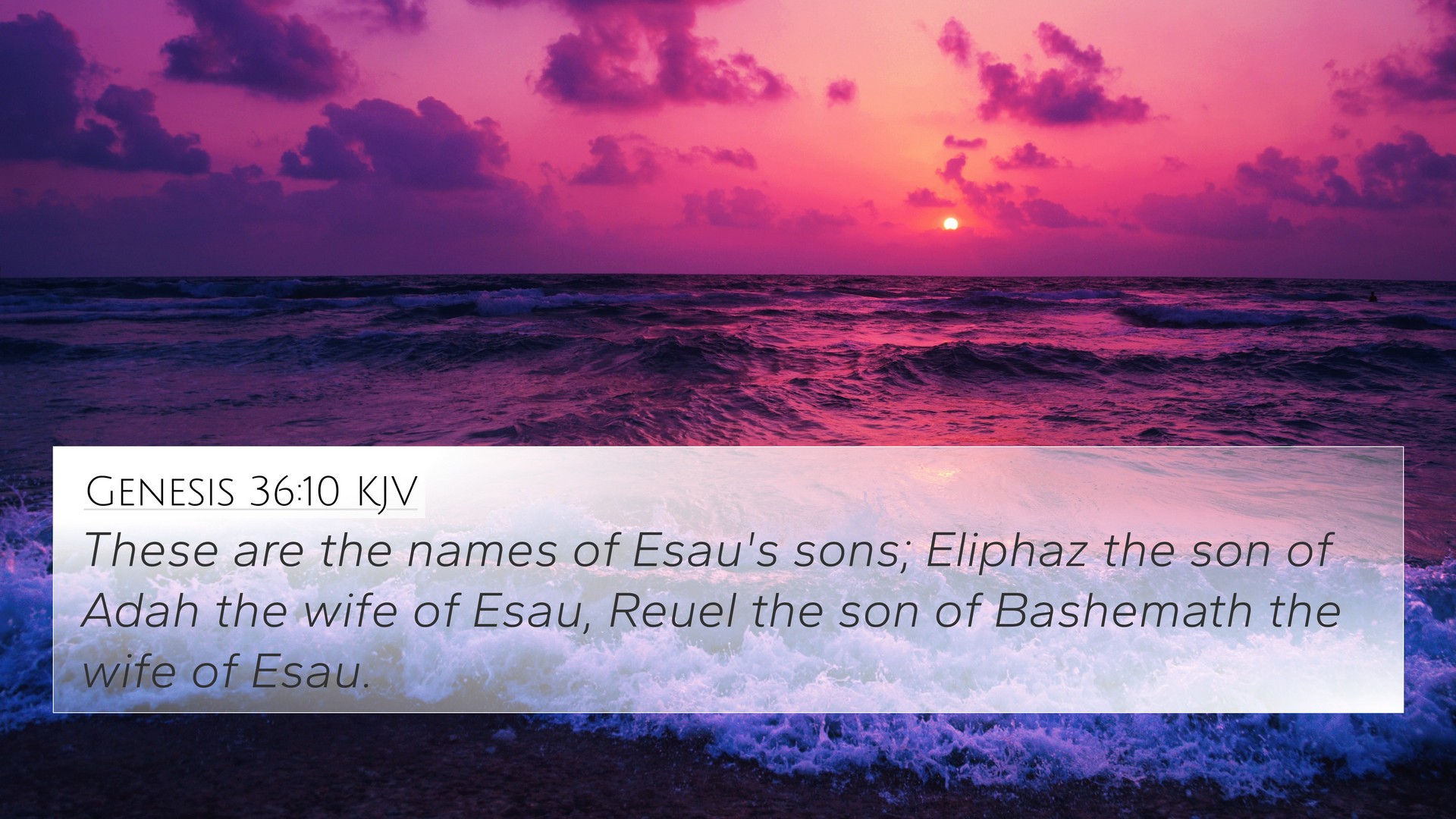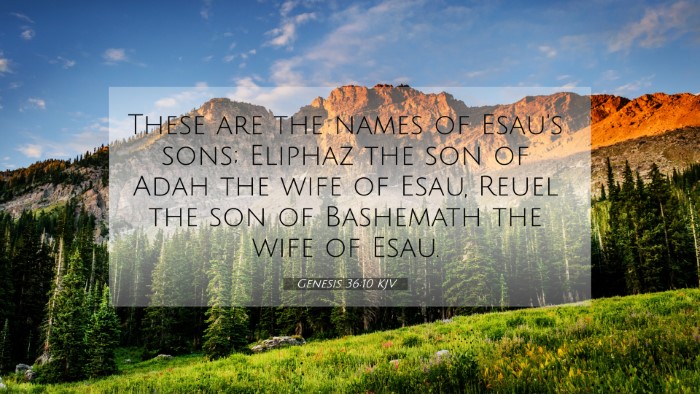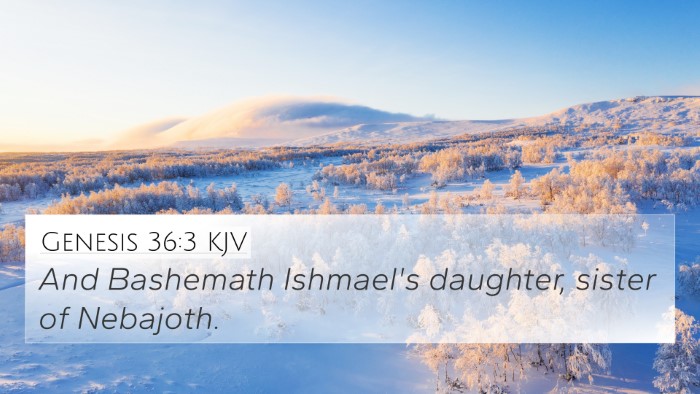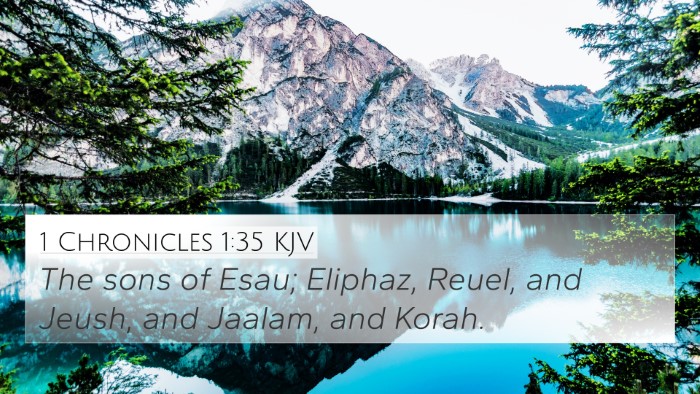Understanding Genesis 36:10
Genesis 36:10 states: "These are the names of Esau’s sons: Eliphaz, the son of Adah the wife of Esau; Reuel, the son of Basemath the wife of Esau."
Summary of Genesis 36:10
In Genesis 36:10, the lineage of Esau is documented, highlighting his two sons, Eliphaz and Reuel. This verse is significant as it sets the foundation for understanding the Edomite people who descend from Esau. The inclusion of the names of Esau's wives indicates the importance of family heritage and connections in Biblical accounts.
Biblical Context
This verse is part of a larger narrative concerning the descendants of Esau, whose story is often juxtaposed with that of Jacob, acting as a foil to the lineage of Israel. Genesis chapter 36 is dedicated to recounting the genealogy of Esau, also known as Edom, and outlining the various clans that emerged from his lineage.
Thematic Connections
This verse ties into several themes relevant to genealogy, family dynamics, and the unfolding of God's plan through particular lineages. The mention of Esau’s sons and their mothers underscores the importance of family relations and cultural identity in the Biblical narrative.
- Genealogy: This verse is a part of the broader genealogical list in Genesis, emphasizing the importance of recording family lines.
- Contrast with Jacob's Lineage: Esau's descendants are often compared with those of Jacob, revealing the ongoing themes of conflict and resolution within families.
- Nation Formation: Esau's descendants went on to form the Edomite nation, illustrating the unfolding of nations from these genealogies.
Commentary Insights
Drawing from Matthew Henry, Albert Barnes, and Adam Clarke, the following insights can be noted:
- Matthew Henry: He emphasizes the providence of God in establishing diverse nations through the descendants of Abraham, highlighting the fulfillment of God's promises.
- Albert Barnes: Barnes points out the significance of Eliphaz and Reuel, noting the lineage's implications in the narrative concerning Israel's history and destiny.
- Adam Clarke: Clarke discusses the cultural significance of naming children in Ancient Near Eastern contexts, indicating the honor and legacy associated with each name.
Cross-References for Genesis 36:10
This verse contains several interconnected themes with various other scripture passages. Consider these cross-references that enhance understanding:
- Genesis 25:30 - Esau's connection to the Edomites.
- Genesis 27:38 - Jacob’s rivalry with Esau.
- Genesis 36:1 - Opening statement of Edom's genealogy.
- Obadiah 1:10 - The fate of Esau's descendants.
- Romans 9:13 - "Jacob I loved, but Esau I hated." Commentary on lineage significance.
- Malachi 1:2-3 - A reference to Jacob and Esau highlighting divine choice.
- Hebrews 12:16 - A warning against being like Esau, linking character with heritage.
Exploring Thematic Connections
Genesis 36:10 establishes important themes that resonate throughout the Bible, leading to deeper explorations of heritage, conflict, and divine purpose.
- Family Legacy: The importance of family lineage as seen here is echoed in other genealogical records.
- Covenantal Promises: Exploration of how God's promises unfold through various family lines, connecting to New Testament themes.
- Conflict and Resolution: The historical and spiritual battles between Jacob and Esau symbolize broader themes of human conflict seen throughout scripture.
Conclusion: The Significance of Genesis 36:10
Genesis 36:10 is not merely a genealogical record; it serves as a critical point of reference for understanding the complexities of biblical narratives and family dynamics. As we explore connections between Bible verses, this verse illustrates how the histories of individuals and nations are intricately woven into the larger tapestry of God's redemptive work.
Resources for Bible Cross-Referencing
For those interested in deeper exploration of cross-references, several valuable tools are available:
- Bible concordance for finding keywords.
- Cross-reference Bible study methods and guides.
- Comprehensive Bible cross-reference materials for sermon preparation.




